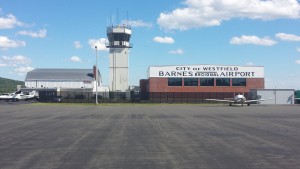WESTFIELD—The Air National Guard responded to a city councilor’s request for information about chemicals on the Guard’s base at Barnes Regional Airport during the city’s airport commission meeting Thursday night.
John Richardson, environmental manager for the base, who spoke on behalf of the Guard, detailed the steps personnel take on the base, as well as highlighting where chemicals that are on the property are listed and how they can be accessed. The lists are maintained regularly, according to Richardson, and several entities are privy to them. Ward six city councilor Bill Onyski made the request for the information during the last airport commission meeting in March.
“It’s the answer we needed to get,” Onyski said following the meeting. “We weren’t sure if the Air National Guard does have a list but it turns out they do and the airport has access.”
The request came on the heels of the ongoing concern with the city’s water system, which was found to have three wells contaminated with perfluourinated carbons (PFCs), such as perfluorooctanesulfonic acid (PFOS) and perfluorooctanoic acid (PFOA). These chemical compounds are found in several products, including aqueous firefighting foam (AFFF)—which was used on the base from 1970 until 1987, according to Richardson. And while no links have been made to AFFF and the contamination, it has been suggested by groups such as the Barnes Aquifer Protective Advisory Committee (BAPAC).
According to Richardson, the Guard and the chemicals on the base are watched by several groups, with oversight coming from state agencies and the Environmental Protection Agency (EPA).
“The state and EPA can come in and inspect us,” he said. “We are not immune from the regulations; we are regulated like any other business.”
Richardson said that they on the base have and continue to put in effort to help alleviate environmental strain. These efforts have included providing three monitoring wells near the former fire training area to the city free-of-charge to allow for water testing, cleaning up seven waste disposal sites and installing a rain garden to reduce pollutants that come from storm water runoff.
The garden, according to Richardson, works by having certain flora planted strategically, and as the storm water comes off the base with potential contaminants picked up, the plants are able to filter the water to reduce the amount of potential contamination.
“The most important part is mitigating environmental exposure,” he said.
Richardson said that their environmental efforts have even gotten the Guard recognized both state-wide and locally. Accolades have included receiving the BAPAC Green Business Award in 2002, as well as receiving a proclamation from former Gov. Jane Swift during one of her terms.
Regarding the listing of chemicals, Richardson said that all chemicals that total over 10,000 pounds on the base have to be submitted to several agencies, which include the EPA and the Massachusetts Emergency Management Agency (MEMA). Additionally, the Westfield Fire Department is given an updated list every year.
Richardson concluded by offering tours of the base and its operations to Onyski, as well as promising to share the hazardous materials plan with the airport.



